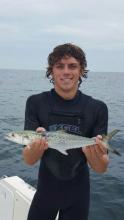Last summer, I worked with Dr. Kinsey’s lab in exploring the relationship between metabolic rate and membrane lipid content. We used oxygen consumption measurements to determine standard metabolic rate and lipid extraction methods to analyze lipid content among a wide range of marine organisms, including fishes, mollusks, and crustaceans. I was involved in field collection, data collection, and data analysis.
After hearing some of my interests and future plans, another professor on campus told me to meet with Dr. Kinsey to talk about the research done in his lab. I did, and his work fascinated me, so I asked if I could do my Honors Project with him in the Fall of 2017. I realized that working in his lab over the summer would be a good way to spend my time until then, so I asked if I could start helping out as soon as possible. There weren’t any other undergraduate lab students in town this summer, so it was a great opportunity to get trained quickly.
This experience benefitted me greatly. I learned about field collection, lab protocol, and data collection through laboratory techniques. This experience also demonstrated practical use of statistics in analyzing data we worked so hard to collect. Additionally, I was able to see basic biological principles in a new light. Much of the project we were working on revolved around metabolic rate, a topic that I’ve studied in numerous classes. However, this experience has deepened my understanding of this concept and related concepts significantly. My applied learning experience challenged me in many ways. Quickly learning lab techniques was difficult, and experiencing the scientific method first-hand was great but involved a learning curve.
The lab skills I learned this summer will help make me competitive for a job or graduate study. The practical experience using the scientific method will help me no matter where I go in the sciences as I continue my education. My problem-solving skills also improved this summer as I went through the trial and error of data collection by myself. Aside from this and contribution to my knowledge of biology, this experience helped improve my interpersonal communication skills. Working with others is something that I will have to do for the rest of my life, and this summer pushed me to be the best I could be as a part of the lab team.





